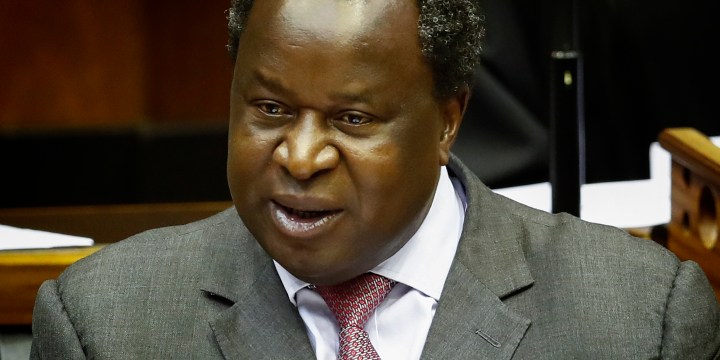BUSINESS MAVERICK
Trade unions unite to defend inflation-beating salary increases for public servants

The Labour Court in Johannesburg will be the setting for trade unions and the government to duke it out over salary increases for about 1.2 million public servants. Trade unions are presenting a united front to get salary increases of between 4.3% and 5.4%, but the government is not budging, saying it is broke.
The battle over inflation-beating salary increases between the government and trade unions, which represent about 1.2 million public servants, has intensified.
Until recently, trade unions were divided on their approach to persuade the government to deliver on its promise of giving public servants salary increases of between 4.3% and 5.4% – depending on their employment level and take-home pay – from 1 April 2020.
However, public servants – including doctors, nurses, teachers, police, correctional services officers and workers in three spheres of government – have not received salary increases in the current year because the government is broke.
Organised labour and the government have been in a dispute since February when Finance Minister Tito Mboweni announced a controversial plan to cut the public sector wage bill by R160-billion over the next three years. The National Treasury estimated that salary increases for public servants in the 2020/21 financial year would cost the government an additional R37.8-billion, pushing the wage bill to take up nearly 60% of tax revenue compared with 42% in 2019/2020.
Trade unions are now joining forces to challenge the government, which wants to renege on the promise of salary increases because public finances are deteriorating. The promise is part of a three-year wage agreement on annual salary increases that the government and trade unions signed in 2018 at the Public Service Coordinating Bargaining Council, where both parties usually negotiate terms of employment. The year 2020 is the last leg of the wage agreement.
Two processes, one goal
To enforce contractual terms of the wage agreement, which is still binding on the government, trade unions launched two separate processes.
The Cosatu-affiliated unions hauled the government into dispute resolution processes of conciliation and arbitration at the Public Service Coordinating Bargaining Council. The Cosatu-affiliated unions are the National Education, Health and Allied Workers’ Union, the South African Democratic Teachers’ Union, the Democratic Nursing Organisation of SA and the Police and Prisons Civil Rights Union.
Meanwhile, at least five trade unions didn’t join the Cosatu-affiliated unions at the council. Instead, the Public Servants’ Association (PSA), the National Professional Teachers’ Organisation of SA, Health and Other Services Personnel Trade Union of SA, the SA Teachers’ Union and the National Teachers’ Union have approached the Labour Court in Johannesburg.
The Cosatu-affiliated unions, whose negotiations with the government at the council have not been successful, will now join other trade unions at the labour court – further worsening the relationship between organised labour and the government.
This is largely the government’s doing. The government, in this case, is mainly the Public Service and Administration Department, which oversees the terms of employment in the public sector.
The government adds a new twist
At the end of August 2020, the department launched an application at the labour court, asking it to declare the enforcement of the wage agreement “unconstitutional”. This forced the department’s ongoing negotiations with the Cosatu-affiliated unions at the Public Service Coordinating Bargaining Council to be postponed pending the conclusion of the recently launched labour court application. The application also means that negotiations between the government and trade unions about the compensation of public servants over the next three years might be delayed. These negotiations usually start in October.
The Cosatu-affiliated unions had until Monday 14 September to respond to the application.
In its application, the department said the additional expenditure of R37.8-billion on salary increases for public servants in 2020/21 had not been approved by Parliament. Without Parliament’s approval, the enforcement of the wage agreement “amounts to unauthorised expenditure” under the Public Finance Management Act, thus making it “unlawful”.
The department has also used the Covid-19 pandemic as an excuse to not enforce the wage agreement.
“Government is under a constitutional duty under the current Covid-19 pandemic and associated health, social and economic crises, to relieve distress and hardship suffered by the poor, unemployed and socially vulnerable, most of whom are not public service employees. Enforcing clause 3.3 [of the wage agreement that guarantees salary increases] would result in taking away funding allocated by Parliament for the purposes described above to the detriment and prejudice of the poor, unemployed and socially vulnerable,” it said.
But trade unions are not buying this, asking how the government can now want to declare a three-year wage agreement unconstitutional when it signed and agreed to its terms in 2018.
“The government was happy to pay public servants salary increases over the past two years under the same agreement that it now wants to declare unconstitutional for its last leg. This is crazy,” one union leader told Business Maverick. DM/BM



















 Become an Insider
Become an Insider
Not a single person in the public sector, with the exception of essential service providers, should be eligible for a pay rise under the current circumstances. Not one.
The government is in trouble. Its argument is absurd.
Stupid to the fore again!